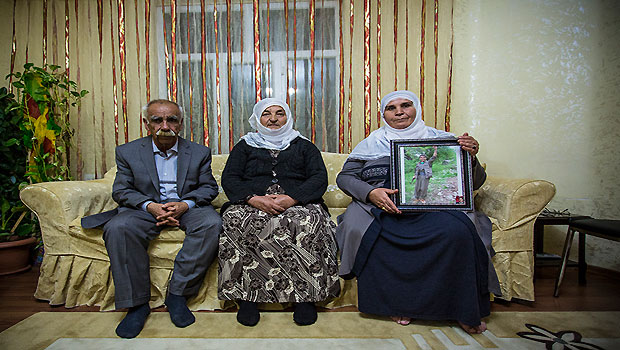
Omar (left), Zine (center), and Eminene (right) at home in Diyarbakir. (AAA)
Diyarbakir, Asharq Al-Awsat—Eminene Özbek and Zine Yilmaz have only just met, but already they have so much in common. “He was such a nice person, and he never wanted to harm anyone,” says Eminene of her son Mahir. When it is Zine’s turn to speak about her own son, her words echo those of her new friend. “We wanted him to study and be someone,” she says. “But he went to the mountains, so what could we do?”
“He went to the mountains.” It’s the euphemism that the Kurdish men and women of south eastern Turkey use to say that their sons (or daughters) joined the Kurdistan Workers’ Party’s (PKK) guerrilla war. And it can be heard thousands of times on the streets of Diyarbakir, the de facto capital of south eastern Turkey’s Kurdish population.
In Eminene’s small flat on the outskirts of the city the women sit together on the floral sofa with Zine’s husband Ömar and tell stories that are depressingly similar in detail. It is the eve of Nowruz—the Persian New Year also celebrated by the Kurds—and Zine and Ömar have travelled 70 km from their village to join the celebrations in the city. In the Kurdish tradition Eminene has offered them a place to stay in her home.
Above them the serious face of a young man—Eminene’s son Mahir—stares down from two framed photographs. On the right he is a student, in a white shirt with a preppy haircut. On the left he is in the khaki uniform of the PKK, holding a Kalashnikov aloft. Eminene tearfully describes his journey from dentistry student to militant.
“He went away to university but after one year he left and went to Europe,” she says. “We knew when he went that he was thinking of joining the fight, and when we couldn’t get hold of him on the phone any more we knew that he’d gone.” Mahir only told his brother that he was joining the guerrillas; all the news that Eminene heard of him came second hand. “We had no calls from him, but occasionally some people from Diyarbakir would go to visit the mountains, and when they came back they would tell me that he’s alive.”
Eminene struggles to understand which moment, if there was a single one, prompted Mahir to leave for the mountains. But Zine says that her son’s struggle started at birth. “I wanted to call him a Kurdish name, Rizgar,” she says. “But when I went to register him they (the Turkish authorities) told me that this wasn’t permitted. I had to give him a Turkish name, so they registered him as Ramazan.”
Throughout his teens Ramazan joined in demonstrations against the Turkish government, getting arrested, released and then arrested again in a cycle that continued until the Nowruz celebrations of 2007. Over 100 people were arrested that year and after the bonfires had burnt out the police called at Zine’s house asking for her son. “So I told him to keep staying late at school,” she says, “but then one day he didn’t come home at all. I heard that he’d gone to the mountains, and then a few weeks later I saw him on television and I knew that it was true.”
Like Eminene, Zine heard nothing more from her son. “I had no idea what he was doing from then on. He took a different name in the mountains.”
The conclusions of the two womens’ stories are also depressingly, and predictably, similar. Mahir was killed in 2010 after eleven years fighting with the PKK. Ramazan died in May 2012, in one of the bloodiest years of the conflict. Both women only found out that their sons had been killed when they saw them on the television. “How do you react when you find out that your child has died before you?” asks Zine. “It’s the very worst thing that can happen.”
But this Nowruz may offer some hope for Eminene, Zine, and the thousands of other Kurdish mothers of Diyarbakir who have lost their children to the mountains. From his prison cell in Istanbul PKK leader Abdullah Öcalan has called for a ceasefire, an end to the Turkish Kurds’ hostilities with the Turkish government and the retreat of fighters from the Turkish mountains. Cynics whisper that an opportunistic Öcalan is betraying Turkey’s Kurds for a bigger prize, a separate Kurdish state within a fractured Syria. The people of Diyarbakir seem to be gaining little from this ceasefire—certainly not the separate Kurdish state that the PKK has waged a bloody thirty year war in the pursuit of.
But Eminene says that the ceasefire is a positive step. “We trust our leader [Öcalan] and we would like peace to happen,” she says. Zine agrees, but more tentatively: “We have had ceasefires before but the government never kept their promises,” she says. “So we have hope, but concerns too.”
In reality, though, the significance of this Nowruz ceasefire depends on the mind-set and actions of the people living here in Diyarbakir and the villages of south eastern Turkey, not the proclamations of a leader in a prison cell hundreds of kilometers to the West.
“The Kurdish problem existed before the PKK,” says Zine’s husband Ömar, “and it can only be solved if we are given the right to speak our language and live without discrimination.”
Maybe even that would not be enough. For thirty years the PKK has promised Turkey’s Kurds a state of their own; it’s an idea that thousands of young men and women—like Mahir and Ramazan—have died for.
“Welcome to Turkey,” says one young man as he waves a flag at the Nowruz celebrations. His friend corrects him. “Welcome to Kurdistan.”
